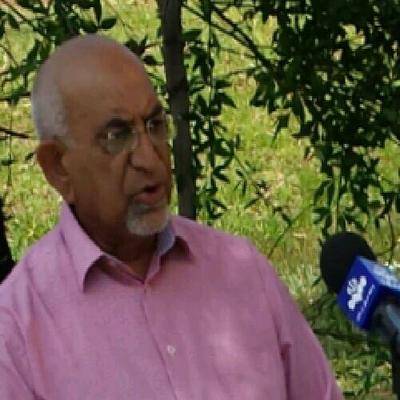The eve of 14 April, 2024, and the hours that followed will be recorded in history as momentous, because the Islamic Republic of Iran launched an aerial assault directly from its home soil against apartheid Israel’s settler-colonial regime. Israeli citizens attested that the tense hours when Iran’s drones and ballistic missiles came over the occupation state’s night skies were bewildering, shocking and alarming. Many claimed to have spent the night in bunkers and safe rooms, anxious and sleepless.
Being on the receiving end of an aerial attack was a new reality that they were confronted with. It was very different to being cheerleaders for the slaughter of thousands of innocent Palestinians in Gaza and the anti-Palestinian pogroms in the occupied West Bank.
A columnist in Forward described the sombre reality of the effects of Iran’s attacks in the following words: “Sunday is the start of the Israeli work week, but schools and many government offices were closed for the day. This cosmopolitan city’s typically crowded light rail was sparse and remarkably silent, with the few passengers glued to their smartphones looking for answers nobody could seem to find.”
While uncertainty about the result of Iran’s historic attack has preoccupied militarily analysts keen to find answers, they certainly cannot ignore the fact that Israel’s deterrence capacity has been severely compromised. Former French military mission chief to the UN, General Dominique Trinquand, made an important point: “The significant development in this conflict is that Iran has directly hit Israel.”
READ: UK’s Cameron urges Israel not to retaliate against Iran
Although advanced American defence technology intervened on behalf of Israel to intercept many of the drones and missiles, the Iranian attack “carries significant weight,” he said. “One cannot underestimate the number of missiles and drones fired at Israel from Iran, Iraq, Yemen and Lebanon, with strikes on the Golan Heights.”
An equally important observation has been made by Didier Leroy, a researcher at the Royal Military Academy of Belgium. According to Leroy, “We have crossed a qualitative threshold that changes the dynamics and repositions Iran on the map as an active military player.”
From his vantage point as a former director of Israeli military intelligence, Amos Yadlin predicts that the Iranian attack may lead to a strategic change in “the war in Gaza, and even to its end.”
The military decree issued by Israel’s war cabinet to block information on the damage caused by Iran’s attacks has gagged local and international media platforms and denied access to verify independently the claims that “minimal” damage was incurred. Such repressive conduct unfairly censors news content.
This has given the apartheid regime carte blanche to disseminate propaganda couched as “information” but far removed from truth and accuracy.
Iranian analyst Professor Sayed Mohammed Marandi insists that Iran’s main targets were two air bases, and that 20 or more missiles struck their targets. “The other drones and older generation missiles were inexpensive decoys that depleted the Israeli air defence systems of most of their very expensive missiles.”
READ: Countering Iran’s overnight attacks costs Israel $1.35bn: Israeli media
Sceptics argue that Iran’s attack was a failure, but they either ignore or deliberately obfuscate the new reality of deterrence injected by the Islamic Republic. From an Iranian perspective, the attack on its consulate in Damascus was a red line which demanded retaliation, otherwise it would erase any notion of deterrence, opening the door for even more brazen Israeli military action, up to and including direct attacks on Iran.
No wonder that former US Marine Corps intelligence officer Scott Ritter has described Iran’s retaliatory attack as one of the “greatest victories of this century.” He added that, “Operation True Promise will go down in history as one of the most important military victories in the history of modern Iran, keeping in mind that war is but an extension of politics by other means. The fact that Iran has established a credible deterrence posture without disrupting major policy goals and objectives is the very definition of victory.”
This point was emphasised by Palestinian academic Professor Sami Al-Arian. He insists that the theory of Israeli deterrence has been greatly undermined. “The strategic situation of the Zionist regime after 7 October is not the same as it was before. Similarly, the regional strategic situation after 14 April is not the same either.”
No matter how Israel’s racist, right-wing regime attempts to spin its lock down as a “victory”, the facts dispute this narrative.
Moreover, Iran’s prestige as the foremost supporter of Palestine’s freedom struggle has been bolstered enormously. It is a position it has not shied away from nor concealed. In fact, part of the strategic calibration that went into its attack was to ensure that Gaza’s plight is neither overshadowed nor forsaken.
Unsurprisingly, Palestinian Islamic Resistance Movement Hamas has backed Iran’s attack and affirmed “the natural right” of countries and peoples in the Middle East to defend themselves in the face of Zionist aggression. “The military operation carried out by Iran against the Zionist entity is a natural right and a due response to the crime of targeting the consulate in Damascus,” said the movement.
The most important lesson to be gleaned from Iran’s heroic mission is that the struggle for liberation, defending sovereignty and resisting occupation and oppression is a just and legitimate cause.
READ: Genocide Joe encourages Israel to treat international laws and conventions with contempt
The views expressed in this article belong to the author and do not necessarily reflect the editorial policy of Middle East Monitor.

![A view of anti-Israel banners and posters placed on building walls in the capital city of Tehran after Iran launched drones, missiles on Israel in response to April 1 attack on consulate in Syria on April 14, 2024. [Fatemeh Bahrami - Anadolu Agency]](https://i0.wp.com/www.middleeastmonitor.com/wp-content/uploads/2024/04/AA-20240414-34267784-34267781-BANNERS_IN_TEHRAN_STREETS_AFTER_IRANS_ATTACK_ON_ISRAEL.jpg?fit=920%2C613&ssl=1)







